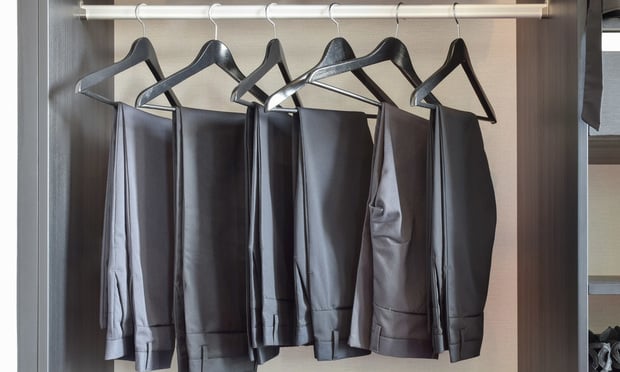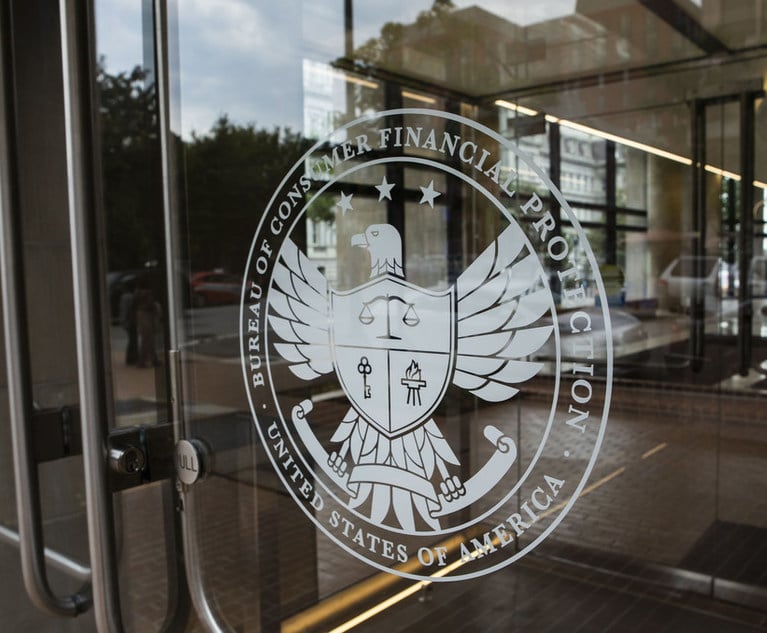A Kick in the Pants? Ex-Judge in Infamous 'Pants' Lawsuit Faces 90-Day Suspension in DC
The disciplinary board said former administrative law Judge Roy Pearson Jr. pursued a legal theory in litigation over a lost pair of pants that "morphed into the preposterous."
May 25, 2018 at 01:30 PM
4 minute read
The original version of this story was published on The American Lawyer

It must have been a pretty special pair of pants.
Former Washington, D.C., administrative law Judge Roy Pearson Jr., who made headlines more than a decade ago for suing a dry cleaning business that allegedly lost a pair of his pants, notched a step closer this week to knowing his fate in a disciplinary case that followed his highly aggressive pursuit of the pant litigation.
The District of Columbia Board on Professional Responsibility—which reports its findings to the final disciplinary arbiter, the D.C. Court of Appeals—handed down a recommendation on Wednesday that Pearson should be suspended from practicing law for 90 days in light of his conduct. Pearson, who was admitted to the D.C. bar in 1978, could not immediately be reached for comment.
“At its start, the case was about a lost pair of pants. As his lawsuit progressed, respondent alleged more and more aggressive positions, eventually demanding millions of dollars under a legal theory the Court of Appeals determined was 'not supported by law or reason,'” the board wrote in Wednesday's report. “As his lawsuit progressed, respondent's liability and damages arguments morphed into the preposterous.”
The board's report and recommendation follow a lengthy saga that began with a lost pair of pants in the early 2000s. Pearson claimed that the owners of Custom Cleaners in D.C. lost a pair of suit pants he brought in for tailoring, then tried to give him pants that weren't his. Pearson sued the business in 2005, hinging his fraud and consumer protection claims on a sign in the store that read, “Satisfaction Guaranteed.”
Pearson alleged that the “Satisfaction Guaranteed” sign was an unconditional warranty to satisfy any claim that a customer made, and he pursued damages for each day the pants were not returned. By the time the case proceeded to a bench trial in 2007, the damages under Pearson's theory exceeded $67 million. D.C. Superior Court Judge Judith Bartnoff rejected Pearson's fraud claims, and the D.C. Court of Appeals upheld her decision in December 2008.
Following his loss in the pant litigation, Pearson, who served as a local administrative law judge from 2005 to 2007, was faulted in an initial 2016 disciplinary opinion for prolonging a “run-of-the-mill dispute into a four-year, no-holds-barred crusade.”
His position on the administrative bench also took a hit amid the lost pants lawsuit. In 2007, Pearson was denied reappointment as a judge—a decision he went on to challenge in a federal lawsuit claiming that other state judges unfairly retaliated against him. That federal suit was ultimately unsuccessful. In 2010, the U.S. Court of Appeals for the District of Columbia upheld a lower court's dismissal of Pearson's claims.
Wednesday's board ruling largely affirmed the 2016 disciplinary opinion—issued by a hearing committee of the D.C. professional responsibility board—but recommends a more severe punishment. The 2016 ruling suggested a 30-day suspension that would be stayed for a two-year probation period. On Wednesday, the board determined that was too light a punishment, given Pearson's pursuit of an unfounded legal theory and his “problematic” attitude throughout the underlying pant litigation and his subsequent disciplinary case.
Ultimately, the disciplinary board ruled that while novel legal theories are important to the development of case law and to applying U.S. statutes in an ever-changing society, Pearson went well beyond what was acceptable.
“Lawyers who seek to change or redefine the law act pursuant to one of the most noble traditions of our profession. We applaud that practice,” the board wrote on Wednesday. “But that is not what respondent did.
“Lawyers are free to make arguments when they are supported by fact and by existing law or a reasoned extension of the law even if they lead to results that at first appear to be unlikely, far-fetched, or questionable,” the board continued. “Instead, we have considered the facts and the legal arguments made in respondent's briefs before both the trial court and the Court of Appeals, and we are convinced that no reasonable attorney would think that respondent had even a faint hope of success in those claims.”
This content has been archived. It is available through our partners, LexisNexis® and Bloomberg Law.
To view this content, please continue to their sites.
Not a Lexis Subscriber?
Subscribe Now
Not a Bloomberg Law Subscriber?
Subscribe Now
NOT FOR REPRINT
© 2025 ALM Global, LLC, All Rights Reserved. Request academic re-use from www.copyright.com. All other uses, submit a request to [email protected]. For more information visit Asset & Logo Licensing.
You Might Like
View All
FTC Finalizes Child Online Privacy Rule Updates, But Ferguson Eyes Further Changes

CFPB Resolves Flurry of Enforcement Actions in Biden's Final Week


'The Tobacco Industry of This Decade': Slew of Class Actions Accuse DraftKings of Creating Addicts
5 minute readTrending Stories
- 1Uber Files RICO Suit Against Plaintiff-Side Firms Alleging Fraudulent Injury Claims
- 2The Law Firm Disrupted: Scrutinizing the Elephant More Than the Mouse
- 3Inherent Diminished Value Damages Unavailable to 3rd-Party Claimants, Court Says
- 4Pa. Defense Firm Sued by Client Over Ex-Eagles Player's $43.5M Med Mal Win
- 5Losses Mount at Morris Manning, but Departing Ex-Chair Stays Bullish About His Old Firm's Future
Who Got The Work
J. Brugh Lower of Gibbons has entered an appearance for industrial equipment supplier Devco Corporation in a pending trademark infringement lawsuit. The suit, accusing the defendant of selling knock-off Graco products, was filed Dec. 18 in New Jersey District Court by Rivkin Radler on behalf of Graco Inc. and Graco Minnesota. The case, assigned to U.S. District Judge Zahid N. Quraishi, is 3:24-cv-11294, Graco Inc. et al v. Devco Corporation.
Who Got The Work
Rebecca Maller-Stein and Kent A. Yalowitz of Arnold & Porter Kaye Scholer have entered their appearances for Hanaco Venture Capital and its executives, Lior Prosor and David Frankel, in a pending securities lawsuit. The action, filed on Dec. 24 in New York Southern District Court by Zell, Aron & Co. on behalf of Goldeneye Advisors, accuses the defendants of negligently and fraudulently managing the plaintiff's $1 million investment. The case, assigned to U.S. District Judge Vernon S. Broderick, is 1:24-cv-09918, Goldeneye Advisors, LLC v. Hanaco Venture Capital, Ltd. et al.
Who Got The Work
Attorneys from A&O Shearman has stepped in as defense counsel for Toronto-Dominion Bank and other defendants in a pending securities class action. The suit, filed Dec. 11 in New York Southern District Court by Bleichmar Fonti & Auld, accuses the defendants of concealing the bank's 'pervasive' deficiencies in regards to its compliance with the Bank Secrecy Act and the quality of its anti-money laundering controls. The case, assigned to U.S. District Judge Arun Subramanian, is 1:24-cv-09445, Gonzalez v. The Toronto-Dominion Bank et al.
Who Got The Work
Crown Castle International, a Pennsylvania company providing shared communications infrastructure, has turned to Luke D. Wolf of Gordon Rees Scully Mansukhani to fend off a pending breach-of-contract lawsuit. The court action, filed Nov. 25 in Michigan Eastern District Court by Hooper Hathaway PC on behalf of The Town Residences LLC, accuses Crown Castle of failing to transfer approximately $30,000 in utility payments from T-Mobile in breach of a roof-top lease and assignment agreement. The case, assigned to U.S. District Judge Susan K. Declercq, is 2:24-cv-13131, The Town Residences LLC v. T-Mobile US, Inc. et al.
Who Got The Work
Wilfred P. Coronato and Daniel M. Schwartz of McCarter & English have stepped in as defense counsel to Electrolux Home Products Inc. in a pending product liability lawsuit. The court action, filed Nov. 26 in New York Eastern District Court by Poulos Lopiccolo PC and Nagel Rice LLP on behalf of David Stern, alleges that the defendant's refrigerators’ drawers and shelving repeatedly break and fall apart within months after purchase. The case, assigned to U.S. District Judge Joan M. Azrack, is 2:24-cv-08204, Stern v. Electrolux Home Products, Inc.
Featured Firms
Law Offices of Gary Martin Hays & Associates, P.C.
(470) 294-1674
Law Offices of Mark E. Salomone
(857) 444-6468
Smith & Hassler
(713) 739-1250








